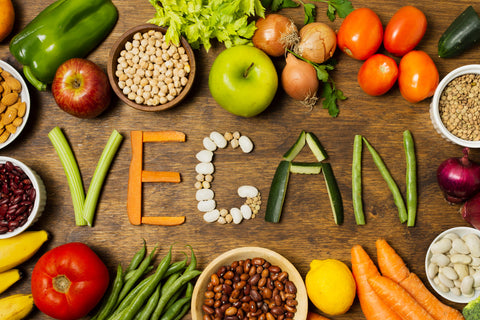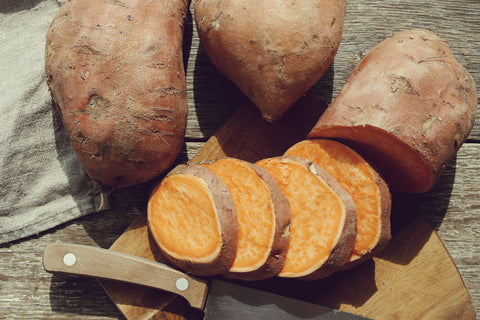What is a Vegan Diet?
A Vegan diet is a plant-based lifestyle that eliminates all animal-derived products and aims to minimise harm to animals and the environment. The primary motivation for many individuals adopting a vegan diet is the desire for a healthier lifestyle.
It focuses on consuming plant foods, including fruits, vegetables, grains, legumes, nuts, seeds and plant-based oils while excluding meat, poultry, fish, dairy, eggs, and other animal-derived ingredients.
Here's a breakdown of foods to include in a vegan diet:
-
A wide variety of colourful fruits and vegetables provide essential Vitamins, Minerals and Antioxidants.
-
Foods like quinoa, brown rice, oats, barley and whole-grain bread provide energy and essential nutrients.
-
Legumes, Beans, lentils, chickpeas, and peas are excellent sources of protein, fibre and various Minerals.
-
Nuts and seeds (almonds, walnuts, chia seeds, flaxseeds and hemp seeds) offer healthy fats, protein, and other nutrients.
-
Tofu, tempeh, seitan and other meat alternatives are good sources of protein for vegans.
-
Plant-based dairy alternatives (like almond, soy, oat, or coconut milk), vegan cheese, and yoghurt made from plant sources.
-
Avocados, olive oil, and coconut oil are examples of plant-based sources of healthy fats.
A well-planned Vegan diet can provide many health benefits, such as lower risk of heart disease, high blood pressure, type 2 diabetes and certain cancers. It also supports weight management and can increase your intake of beneficial nutrients.
What is the difference between Vegan and Vegetarians?
The primary difference between Vegetarians and Vegans lies in the types of foods they exclude from their diets.
Vegetarians typically avoid consuming meat, poultry, and fish. However, their diets may include:
-
Lacto-ovo vegetarians: They avoid meat, fish and poultry but include dairy products and eggs in their diet.
-
Lacto-vegetarians: They exclude meat, fish, poultry and eggs but include dairy products.
-
Ovo-vegetarians: They avoid meat, fish, and dairy but include eggs in their diet.
Vegans, on the other hand, follow a plant-based diet and lifestyle that excludes all animal-derived products, not only in food but also in other aspects of their lives, focusing on cruelty-free and environmentally conscious choices.

The Most Common Deficiencies in Vegans
Several nutrient deficiencies can potentially be more common in a vegan diet due to the absence or limited intake of certain food groups. Some of the most common deficiencies in vegans include:
-
Vitamin B12 is primarily found in animal products. Vegans should consider taking B12 supplements or consuming fortified foods like plant-based milks, breakfast cereals, or nutritional yeast to prevent B12 deficiency, which can lead to anaemia and neurological issues.
-
Plant-based Iron (non-heme iron) is less readily absorbed than heme iron from animal sources. Including Iron-rich foods like lentils, tofu, chickpeas, beans, spinach, quinoa, and fortified cereals. Along with consuming Vitamin C-rich sources to enhance absorption, which is essential to prevent iron deficiency anaemia.
-
Dairy products are a source of Calcium and vegans need to ensure adequate calcium intake from fortified plant milks, tofu, tempeh, leafy green vegetables like kale and collard greens, almonds and figs to maintain bone health and prevent deficiencies.
-
Sources of Vegan Omega 3 like flaxseeds, chia seeds, hemp seeds, walnuts and algae-based supplements should be consumed to maintain a healthy balance of essential fatty acids.
-
Plant-based Zinc sources such as legumes, nuts, seeds, whole grains, and fortified cereals should be consumed, and optimising absorption through proper food preparation (soaking, sprouting, or fermenting), is important to prevent zinc deficiency.
-
Vitamin D is mainly obtained through sunlight exposure. Depending on factors like location and lifestyle, vegans might need to consider supplementation or fortified foods, especially during months with limited sunlight exposure, to prevent deficiencies.
It's crucial for vegans to plan their diets carefully to ensure they're obtaining adequate amounts of these nutrients. Incorporating a variety of plant-based foods, fortified products and considering supplements, when necessary, can help prevent these common deficiencies.
Why are They Common?
Deficiencies in certain nutrients among vegans can occur due to several reasons:
Some essential nutrients are predominantly found in animal-based products. If these are not adequately replaced with plant-based alternatives or fortified foods, deficiencies can occur.
Although many plant-based proteins are available, some might lack certain essential amino acids, leading to a lack of amino acids in the diet. Combining various plant protein sources throughout the day can ensure a complete range of amino acids.
Non-heme Iron and plant-based sources of Calcium, Zinc and Omega-3 fatty acids may have lower bioavailability compared to their animal-based counterparts. Proper food pairings and choices can improve absorption.
Sometimes, individuals might not consume a wide enough variety or quantity of plant-based foods to meet their nutritional needs. Additionally, factors like malabsorption issues, or certain medical conditions can affect the body's ability to absorb nutrients.
Vitamin D deficiency can occur in individuals who don't get sufficient exposure to sunlight, which is necessary for the body to produce Vitamin D.
Without proper knowledge and meal planning, individuals might inadvertently exclude essential nutrients from their diet, leading to deficiencies.

How to Combat Nutrient Deficiencies?
Maintaining a balanced vegan diet requires careful attention to ensure you're getting all the necessary nutrients. Here are some strategies to combat nutritional deficiencies on a vegan diet:
-
Diversify your food intake: Consume a wide variety of fruits, vegetables, grains, legumes, nuts and seeds to ensure you're getting a broad spectrum of nutrients.
-
Focus on key nutrients: Pay attention to specific nutrients that can be lacking in a vegan diet.
-
Understand Nutrient Requirements: Familiarise yourself with the nutrients your body needs.
-
Monitor Portion Sizes: Overeating or undereating can impact nutrient intake. Maintaining portion control helps in consuming a variety of nutrients without excessive calories or insufficient intake.
-
Consider Supplementation: Sometimes, due to dietary restrictions or specific health conditions, it might be difficult to obtain all necessary nutrients from food alone. Supplements can help fill in the gaps.
-
Regular Health Check-ups: Periodic health check-ups can help identify any potential deficiencies. Your doctor can recommend tests and provide guidance based on your specific needs.
-
Read Food Labels: Pay attention to the nutritional content in the food you buy. This can help you make informed choices and balance your diet.
-
Avoid Excessive Processing: Processed and refined foods often lack essential nutrients. Try to choose whole, unprocessed foods to maximise nutrient intake.
-
Moderate Alcohol and Caffeine Consumption: Excessive alcohol and caffeine intake can interfere with the absorption of certain nutrients.
-
Stay Hydrated: Water is essential for overall health and aids in nutrient absorption and transportation within the body.
-
Special Considerations: Pregnancy, certain medical conditions, and specific life stages may require additional attention to certain nutrients.
-
Rotate Your Foods: Eating a variety of foods can help cover different nutrient needs. Rotate your choices to ensure a broad intake of nutrients.
-
Cooking Methods: Some nutrients can be lost during cooking. Be mindful of cooking methods that help preserve the nutritional content of your food.
Related Articles
- Is Vitamin D3 Suitable for Vegans and Vegetarians – HealthAid®
- Key Nutritional Deficiencies and How to Prevent Them – HealthAid®
Sources
- Vegan Diet Plan Guidelines, Food List and Benefits - Dr. Axe (draxe.com)
- The Most Common Nutrient Deficiencies in Women - Dr. Axe (draxe.com)
- 4 Reasons Why Some People Do Well as Vegans (While Others Don't) (healthline.com)
- Is a Vegan Diet Safe for Children? (healthline.com)
- Vitamin B-12 - Mayo Clinic
- Vegans May Lack Essential Nutrient Intake - Mayo Clinic News Network
- Veganism: Vitamin B12 is well supplemented, iodine is a matter of concern | ScienceDaily
- Risk of Iodine Deficiencies in Norwegian Vegans, Vegetarians and Pescatarians - NHRI (naturalhealthresearch.org)
Image by Freepik, Image by jcomp on Freepik, Image by Freepik
Any information or product suggested on this website is not intended to diagnose, treat, cure, or prevent any medical condition. Never disregard medical advice or delay in seeking it because of something you have read on this website. Consult your primary healthcare physician before using any supplements or making any changes to your regime.





